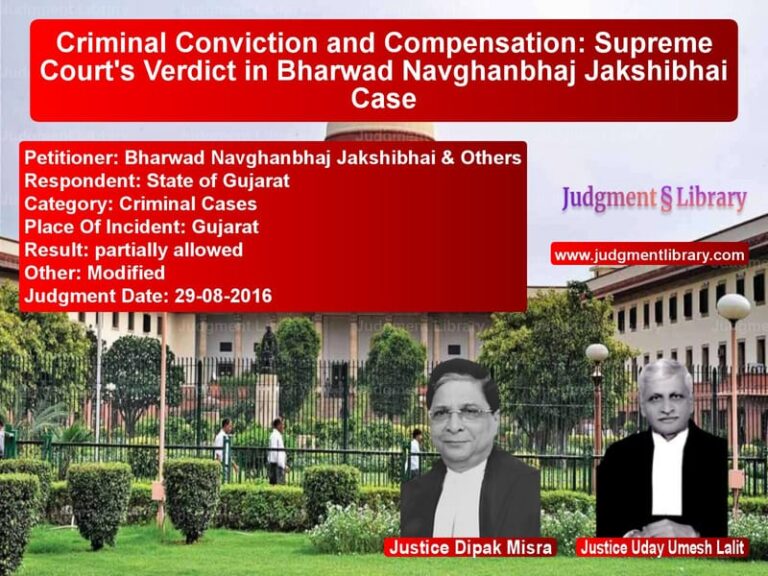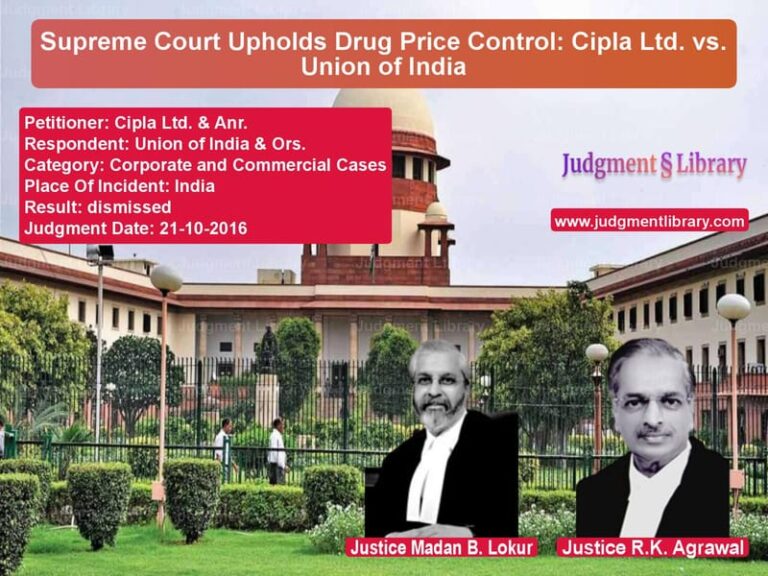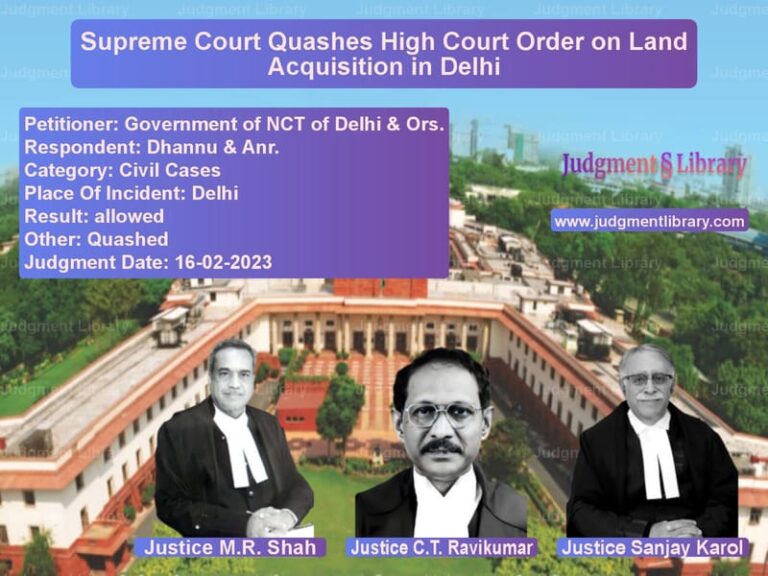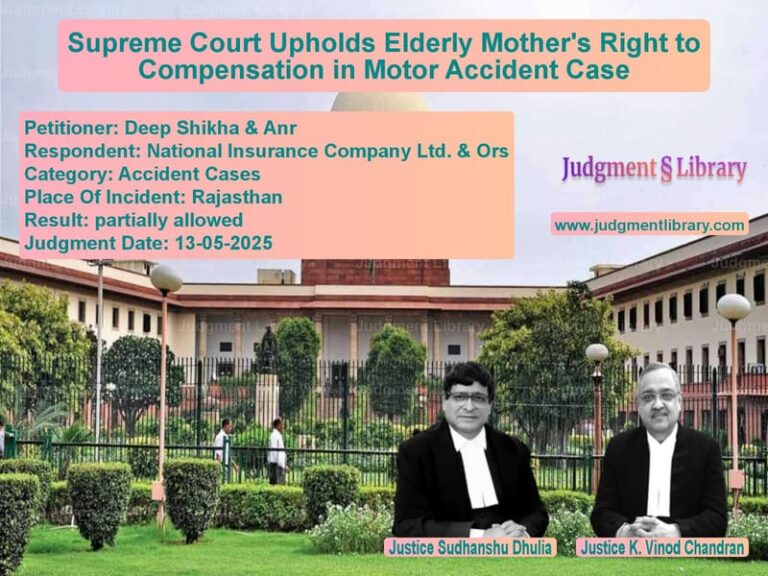Supreme Court Grants Bail to UAPA Accused After Four Years in Custody
The Supreme Court of India recently ruled in favor of granting bail to two accused individuals, Yedala Subba Rao and another, who had been charged under the Unlawful Activities (Prevention) Act, 1967 (UAPA). The case involved allegations of their involvement in the killing of a sitting MLA and an ex-MLA by members of a banned Maoist organization. The court found that the prosecution failed to establish a prima facie case strong enough to deny them bail under Section 43D(5) of the UAPA. The judgment also highlighted concerns regarding prolonged incarceration without trial.
Background of the Case
The case stemmed from an incident on September 23, 2018, in which two political leaders, Kidari Sarveswara Rao (a sitting MLA) and Siveri Soma (a former MLA), were assassinated near Livitiputtu village, Andhra Pradesh. The attack was allegedly carried out by members of the Communist Party of India (Maoist), a banned terrorist organization under UAPA. FIR No. 65 of 2018 was registered at Dumbriguda Police Station, and the case was later transferred to the National Investigation Agency (NIA).
The appellants, accused numbers 46 and 47 in the charge sheet, were arrested on October 13, 2018. They were charged under various sections of the Indian Penal Code (IPC), UAPA, and the Explosive Substances Act. The charge sheet listed 79 accused individuals, of whom some remained absconding. Despite being in custody for over four years and seven months, the appellants had not yet faced trial.
Petitioner’s Arguments (Yedala Subba Rao & Anr.)
- The prosecution had failed to present direct evidence linking them to the crime.
- The charge sheet primarily relied on circumstantial evidence, including call detail records (CDR) and alleged financial transactions.
- They had been in jail for over four years without trial, violating their fundamental rights under Article 21 of the Constitution.
- Other co-accused, including accused No. 84, had already been granted bail by the Andhra Pradesh High Court.
- The alleged recovery of explosives from one of the accused was unreliable and fabricated.
Respondent’s Arguments (Union of India)
- The accused were in regular contact with Maoist leaders and were part of the criminal conspiracy.
- One of the accused allegedly procured and supplied medicines worth Rs. 8,000 for Maoists, supporting their underground activities.
- A landmine was allegedly recovered at the instance of one of the accused, which was intended for an attack.
- The accused had provided logistical and shelter support to the Maoist group responsible for the assassinations.
- Under UAPA, the burden of proof is lower for establishing a prima facie case to deny bail.
Supreme Court’s Observations
- The prosecution had failed to establish “reasonable grounds for believing that the accusation against such person is prima facie true,” which is a requirement under Section 43D(5) of UAPA.
- The evidence linking the accused to the crime was weak and circumstantial.
- The alleged recovery of explosives was not sufficiently proven, and there were discrepancies in the investigation process.
- The accused’s interactions with co-accused were insufficient to demonstrate criminal conspiracy.
- Continued incarceration without trial, especially given the number of witnesses (144), was unjustifiable.
- The Supreme Court noted that another co-accused (Accused No. 84) had been granted bail on similar grounds by the Andhra Pradesh High Court.
Key Judicial Findings
- The Supreme Court held that while UAPA imposes strict bail conditions, prolonged detention without trial could not be justified when the prosecution’s case was weak.
- The appellants had been in custody for over four years, and with a large number of witnesses yet to be examined, the trial was unlikely to conclude soon.
- The court found no substantive evidence that the accused were actively involved in planning or executing the attack.
Final Judgment
The Supreme Court ruled in favor of the appellants:
- The High Court’s order denying bail was set aside.
- The appellants were granted bail with stringent conditions to ensure they did not influence the trial.
- The Special Judge handling NIA cases in Vijayawada was directed to set appropriate bail conditions.
Implications of the Judgment
The ruling has significant implications for cases under UAPA:
- Judicial Oversight in UAPA Cases: The case reinforces the judiciary’s role in ensuring that the strict provisions of UAPA do not result in undue prolonged incarceration.
- Right to Bail in Delayed Trials: The judgment emphasizes that even in terrorism-related cases, prolonged detention without trial cannot be justified.
- Burden of Proof on the Prosecution: The ruling clarifies that a mere allegation of association with a banned organization is insufficient to deny bail unless backed by strong evidence.
Conclusion
The Supreme Court’s decision in Yedala Subba Rao & Anr. v. Union of India highlights the importance of balancing national security concerns with the constitutional right to personal liberty. While the UAPA imposes stringent bail conditions, the ruling underscores that courts must ensure that these provisions are not misused to justify prolonged incarceration without trial. By granting bail, the court has reaffirmed that the burden of proving a prima facie case lies with the prosecution and that mere association or weak circumstantial evidence cannot be used to indefinitely deny a person their fundamental rights.
Petitioner Name: Yedala Subba Rao & Anr..Respondent Name: Union of India.Judgment By: Justice Abhay S. Oka, Justice Rajesh Bindal.Place Of Incident: Visakhapatnam, Andhra Pradesh.Judgment Date: 17-04-2023.
Don’t miss out on the full details! Download the complete judgment in PDF format below and gain valuable insights instantly!
Download Judgment: yedala-subba-rao-&-a-vs-union-of-india-supreme-court-of-india-judgment-dated-17-04-2023.pdf
Directly Download Judgment: Directly download this Judgment
See all petitions in Bail and Anticipatory Bail
See all petitions in Terrorist Activities
See all petitions in Custodial Deaths and Police Misconduct
See all petitions in Judgment by Abhay S. Oka
See all petitions in Judgment by Rajesh Bindal
See all petitions in allowed
See all petitions in Quashed
See all petitions in supreme court of India judgments April 2023
See all petitions in 2023 judgments
See all posts in Criminal Cases Category
See all allowed petitions in Criminal Cases Category
See all Dismissed petitions in Criminal Cases Category
See all partially allowed petitions in Criminal Cases Category







